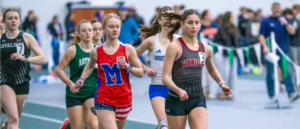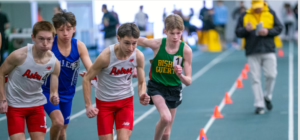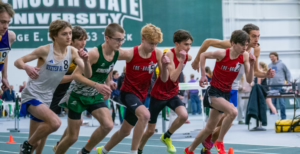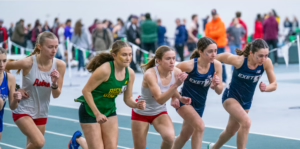With three months of coaching retirement in the rearview window, and twenty five years of experience beginning to grow mold in the recesses of my brain, I thought it might be cathartic to synthesize what I’ve learned about coaching over 70 seasons. Time and time again I’ve been asked by coaches, both within the running community and outside it, what’s the secret to success. I’ve always replied either there aren’t any, or that I don’t know. I realize, having had pretty good success, that might sound cagey but honestly I don’t really know about the specifics that have brought Mascenic the “riches” we’ve gained. That’s not to say I have no idea what got us to where we’ve been over the last twenty five years, but I can’t exactly extract the “essence” of what it is that we do. Sure, I’d say we take care of business but that’s certainly open to interpretation.
So not to sound dodgy, I’ll say what I do know. I’ve mentioned before that for many reasons at Mascenic we are at a disadvantage compared to most schools without an all weather track. What we do have is a sometimes plausible, sometimes problematic, stone dust track that can be as much as five seconds slow per lap and under good conditions, probably one to two seconds slower than an all surface track. Having learned this, I’ve learned to not rely on track workouts very much, especially for track. To be entirely honest, and why not as I’m not coaching anymore, we only had seven specific track workouts during the cross country season. And truth be told, we would only hold these workouts if they coincide with days that there wasn’t a soccer game. In the event there was a soccer game, there would be spectators sitting on the track so we’d take the workout to the cross country course where we had 200, 300, 400, 500 and 800 increments measured out. With all of that said, during cross country season I did not put too much emphasis on what we “do” on the track.

Instead we done a lot of aerobic work. Knowing that aerobic fitness is the ultimate limiting factor on exactly how fast someone can run, we would focus on getting kids aerobically strong through various methods of increasing aerobic fitness. To this I’d be willing to talk, ad nauseam, on the ways to get that done. Over the years I’ve come up with and disposed of many variants of aerobic work, looking to either simplify the system or develop more stimulus. I’ve learned you can have a great aerobic workout written in the plan, but if the troops can’t perform it correctly, it holds little value.
But we’ve done very little on specific speed. This might mean they don’t squeeze every little bit of speed out of themselves, but with small teams I never could afford any injuries nor could I rely on the athletes to not want to overdo it in an effort to “maximize” their speed. Kids love to run fast and left to their own devices often overcook themselves. I always figured if my kids were strong enough to be there at the finish, they had what they needed to get the job done. While not always true, it’s been true more than not.
I also know we’ve lost almost as many close contests as we’ve won. Generally speaking, we’ve been really good at getting ready to win a State Championship, even though we’ve not always walked away with the prize. In some ways this perplexes me, as how do we, as a smaller school in D3, perpetually be in the running for the championship, but walk away either winning, or coming so close to winning, it’s statistically non conforming. We’ve won eight boys championships, come in second twice, third once, and then fifth only twice, and to be truthful, who cares about the rest. We’ve won on a tie and lost on a tie.
Statistically, this is a big anomaly among schools of our size. For the last two years we’ve been solidly in the D4 ranks, schools with less than 250 students. But just last season our girls were in the top ten for more than half the season. We had 8 girls on the team, very dissimilar to most of the other teams in the top ten. We are at a significant deficit with regard to potential cross country athletes compared to most schools we compete with. I’ve never been afraid of that, more than willing to contest schools much bigger than us. But it’s statistically nonconforming.

We have spent a lot of time preparing them mentally and physiologically to handle the rigors of performing at the SCs, without much time spent actually focused on the outcome of the SCs. Winning is always part of the plan, but the basics of the plan are to be prepared as best we can to perform the best we can and let the rest take care of itself. I’ve never felt pumping up the athletes to go out and beat another team or individual, or set up too many race specific scenarios, is advantageous. And that’s probably just because I’m not good at it, much like I stink at calculating team scores on the fly. But we’ve found success in preparing athletes to run their best races and let everyone else try to beat us. This might sound bold but it has always allowed us to focus on what we’re doing, not anyone else.
But how do you develop athletes that can compete at the top of their division and beyond? I think the best plan is to never set limits, especially based on their division. I’ve had some of the top talents come through my ranks, some I’ve helped develop, others simply studs in their own right. One of the most important things is to not stand in their way. Yes, it’s important to impart to them how they need to work hard, put in the work, in order to be the best but let’s not forget they were pretty damn good before we got them. Making them fit into our system won’t necessarily ensure they are state champions in the future.

Similarly, convincing hard working athletes they can do pretty much whatever they set their mind to, if they simply keep at it, is probably the most important thing to me; or perhaps where I feel I can have the greatest impact on an athlete. Good athletes will always be “good”, but getting perhaps mediocre athletes to become the grinders who simply outwork other people is an art, one I have not perfected. But giving them the canvas, the opportunity to achieve is very important. I have gone on record that with all the talented D3 All Stars we’ve had, half of them are entirely self made, meaning they weren’t great runners but willed themselves to be great.
And it’s not like it’s magic. We’ve simply shown them what is possible, given them the tools and the game plan to get there, and guided where necessary to prepare them to do their best. And funny enough, that tends to work.
Which leads me to my final point. The biggest gift you can give your athletes is the opportunity for success. Make sure you have a solid program. Make sure you’re invested and they know it. Provide steady and unwavering support in their endeavor to improve themselves. Show them how to do things right and acknowledge when they are on the path.
Do these things and your kids will become champions, regardless of whether they take home a state title. They’ll be champions at life and that’s worth more than some walnut plaque and some ribbons to be hung off a hook. You do that and you have a successful program.
And you might just find that those trinkets of success find their way to your team anyway.
See you out there.











